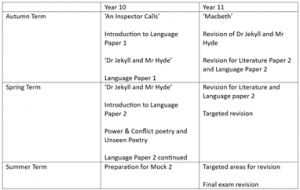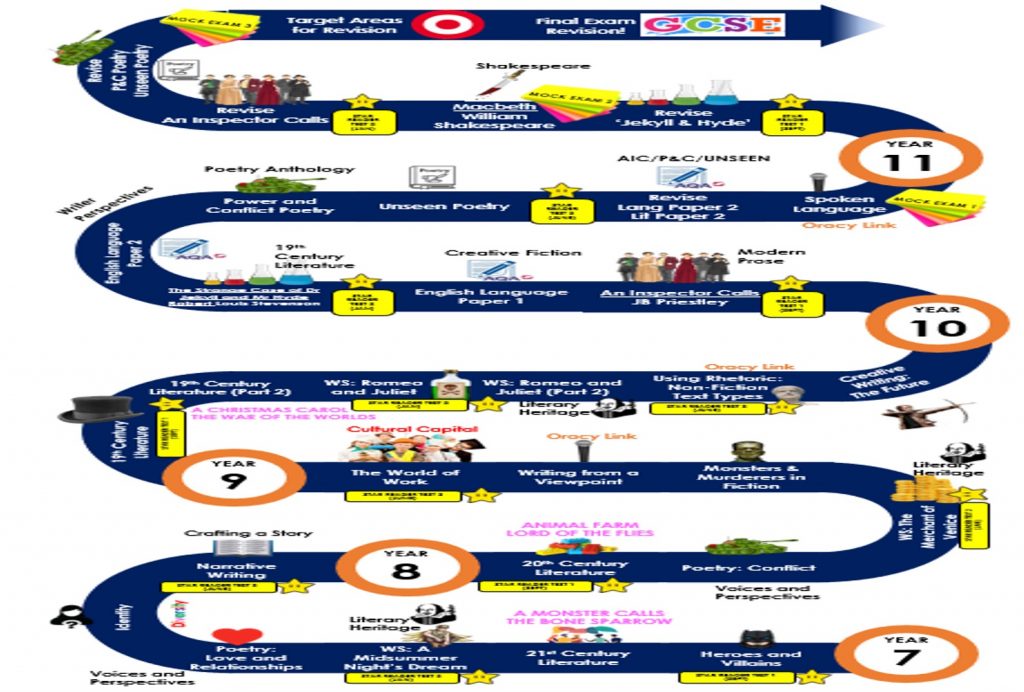Key Stage 4: English
Key Stage 4
Curriculum Intent
In English at Murray Park, students cover a wide range of inspiring topics all designed to promote high standards of language and literacy, whilst developing in them a love of literature and an appreciation of our rich and varied literary heritage. From creative writing to Shakespeare to poetry to grammar, students are exposed to different texts, contexts, viewpoints and writers across the five years, culminating in Key Stage 4.
The national curriculum for English at Key Stage 4 aims to ensure that students:
- Develop an appreciation and love of reading, increasingly engaging with challenging, high-quality material including classics and literary non-fiction
- Understand and critically evaluate increasingly challenging texts, from novels to plays to poetry
- Make informed personal responses to texts, being able to critically examine them in such ways as by analysing the language choices made or by comparing how different texts present ideas
- Write accurately, fluently, effectively and at length for pleasure and for information
- Plan and edit their work through considering who they are writing for and how they are using vocabulary, spelling and grammar effectively and accurately to achieve this
- Use Standard English confidently in their own writing and speech.
Our curriculum is designed with National Curriculum and AQA GCSE syllabus requirements embedded, but also with our students in mind. We aim to intrigue them, to amaze them; we choose our topics very carefully so that students enjoy their learning and are also challenged. Core skills in writing, reading and spoken language are developed so that students feel confident with different types of text and are able to express themselves with imagination and accuracy. We want students to understand the writer’s craft in both their reading and their language, relating ideas to a text’s context and understanding the influence of these factors.
When devising the English curriculum, we look to augment students’ spiritual, moral, social and cultural development: topics and texts are chosen with a view on developing these, from AQA’s ‘Power and Conflict’ poetry up to pre-1914 texts, such as Stevenson’s ‘Strange Case of Jekyll and Hyde,’ all the way to relatively modern texts such as Priestley’s ‘An Inspector Calls.’ In addition, we are able to welcome visitors such as the Young Shakespeare Company, who perform the play studied at Key Stage 4 as part of English Literature (‘Macbeth’).
Curriculum overview
During Key Stage 4 students will study both the English literature and English language elements of the GCSE specification. in Year 10, students read and explore their GCSE English literature texts. As a staff, we have chosen The Strange Case of Doctor Jekyll and Mr Hyde,’ ‘An Inspector Calls,’ the AQA Power and Conflict anthology poetry and ‘Macbeth’. However, the current Year 10 cohort will study ‘Macbeth’ at the start of Year 11 to enable them to study both English Language Paper 1 and Paper 2 for a half term. These are all chosen to capitalise on staff expertise as well as for their accessibility and captivating ideas and themes.
In Year 11, students continue to revise the literature texts for their GCSE examinations, with time set aside for fortnightly unseen poetry lessons and weekly language lessons. Staff continue to develop students’ love of learning and literature through studying a wide variety of interest non-fiction text and fictional extract during language study.
Both Year 10 and 11 have fortnightly lessons in the library and continue to develop their reading through using accelerated reader.
By the end of Key Stage 4, we hope to have offered a wide variety of topic areas as well as increased students’ cultural capital. In terms of equality and diversity, students experience texts from a range of different backgrounds across the two years of the key stage, with race, political attitudes and gender and sexuality all explored. We want our students to be knowledgeable about different ways of life and be able to confidently discuss them both verbally and in their written work.
Literacy
Everything that students do in English at Key Stage 4 is designed to develop their core skills in reading, writing and speaking and listening. From their Accelerated Reader lessons that test and then seek to progress reading ages, to extended writing that are planned with technical writing skills at the forefront, as well as every topic included in our curriculum, students are constantly asked to focus on how literate they are and how they could advance this. This is in addition to the focus we give ‘literacy errors’ when giving feedback: spellings, punctuation and grammar. We want all of our students to be able to communicate their ideas in the most effective ways possible.
Extra-curricular activities
The English department runs the school newspaper, with students of all years making contributions and developing their ability to write interesting, informative pieces. Articles, quizzes and interviews are just three of the features parents find when the newspaper is sent home periodically.
Every day, Mrs Makasis also runs a variety of activities in the library. From meditation to games to exploring new books with students, inspiration can be found every lunchtime.
During form time, intervention sessions take place. The intention of these is to revise and recap GCSE English Literature content, as well as developing the students’ skills in creating revision materials. Revision sessions take place after school also: ‘Commit to Six’ is primarily aimed at Year 11 students and offers students the opportunity to recap and expand on their knowledge of the skills and content covered in their GCSE examinations. Once each term, ‘Twilight’ intervention sessions are offered, where students work intensively on their English studies until around 7pm.



